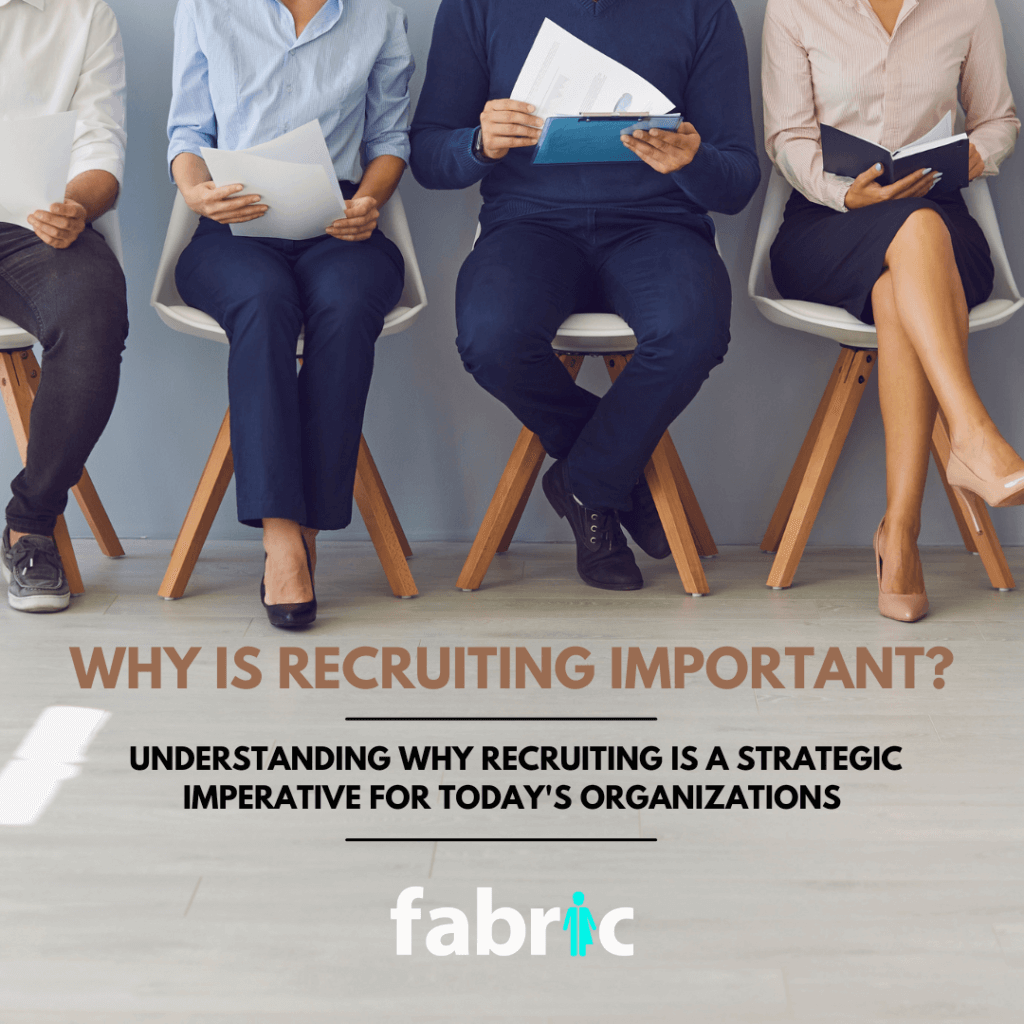Understanding Why Recruiting Is a Strategic Imperative for Today’s Organizations

Why is recruiting important?
The modern adage “people are our greatest asset” holds now more than ever. But, beyond rhetoric, the success of organizations today hinges on the ability to attract, select, and retain top talent.
Recruiting, as we all know, isn’t just about filling vacant positions or sourcing resumes; it’s a strategic imperative that can make or break a company’s trajectory in today’s dynamic marketplace.
Here, we’ll delve into the multifaceted significance of recruiting, exploring how it drives growth, shapes culture, and ultimately, propels success. From the perspectives of seasoned recruiters and Fabric Staffing’s visionary CEO, we’ll uncover why investing in a recruiting team isn’t just an option—it’s a prerequisite for thriving in the competitive business landscape of the 21st century.
Fueling Company Growth
One of the primary ways recruiting drives growth is by bringing in the right people with the skills, experience, and cultural fit to propel innovation and productivity. As Siraina Dickens-Cole, a seasoned recruiter, emphasizes, it’s not just about finding individuals with the requisite skill set but also about understanding the nuances of team dynamics and culture. When recruiters align candidate attributes with team needs and organizational culture, they lay the foundation for sustained growth.
“Recruiting isn’t just about putting any person with the skills in a role. It’s about finding the right person with the right skills. Besides skill set, hiring managers should be sharing what matters the team. Do you need a go-getter? How important is communication? Will this person need to be a big collaborator?
The more you share about your team’s culture, the easier it is for a recruiter to find someone who is an all-around fit. This leads to hiring employees who not only love their jobs, but will lead innovation at your company and want to see your product grow. If you want to see major growth at your company, invest in your recruiting team!”
– Siraina Dickens-Cole (Recruiter, Fabric Staffing)
Consider the analogy shared by Genevieve Garcia, Senior Recruiter, likening recruiters to gardeners cultivating a thriving work ecosystem. By carefully selecting and nurturing top talent, recruiters create an environment where innovation flourishes and teams thrive. This proactive approach to recruiting doesn’t just fill seats; it cultivates a culture of excellence where employees are empowered to perform at their best.
“I think recruiters are the MVPs of company growth and culture! By bringing in top talent that fits the vibe of a team, they’re like gardeners cultivating a thriving work ecosystem.
Recruiters play such a pivotal role in shaping a company’s growth and culture by sourcing and hiring top talent technically and personality-wise. We are the gatekeepers of a company’s success, ensuring that the right people are in the right roles. By selecting candidates who not only have the necessary skills but also align with the company’s values and vision, recruiters contribute crucially to a positive work environment and foster a culture of excellence.
Investing in hiring the best talent pays dividends in the long run, driving innovation, productivity, and ultimately, business success.”
– Genevieve Garcia (Senior Recruiter, Fabric Staffing)
Moreover, recruiting directly impacts a company’s ability to stay competitive in the marketplace. Organizations must adapt quickly to changing market dynamics and emerging technologies in today’s fast-paced business environment. Recruiting top talent ensures companies have the skills and expertise needed to stay ahead of the curve. Whether it’s hiring data scientists to unlock insights from big data or attracting sales professionals with a knack for forging strategic partnerships, effective recruiting strategies enable companies to capitalize on new opportunities and stay ahead of competitors.
Shaping Company Culture
Beyond driving growth, recruiting plays a pivotal role in shaping company culture. As Rory Bebbington, CEO, aptly puts it, recruiting is about more than just matching buzzwords on a resume; it’s about understanding the human element. Recruiters serve as gatekeepers of a company’s culture, ensuring that candidates not only possess the necessary skills but also align with the organization’s values and vision.
A strong company culture fosters a sense of belonging and purpose among employees, leading to higher levels of engagement, satisfaction, and retention. When recruiters prioritize cultural fit alongside technical competence, they contribute to the creation of a positive work environment where employees feel valued, respected, and motivated to contribute their best work. This, in turn, enhances employee morale and productivity, driving overall company performance.
“There have been countless instances where I’ve successfully placed the perfect candidate in a role, despite their resume initially raising doubts. I’ve lost track of the number of times hiring managers initially passed on candidates, only to circle back months later and enthusiastically embrace the very same individuals we’d fervently recommended.
Recruiting isn’t about algorithms or data (although this stuff does help); it’s about people. You can have all the fancy AI and keyword scanners in the world, but if you can’t read between the lines of a human being’s potential, you’re just wasting everyone’s time.”
–Rory Bebbington (CEO, Fabric Staffing
Recruiters play a crucial role in diversity and inclusion initiatives within organizations. By actively seeking out candidates from diverse backgrounds and perspectives, recruiters help create a more inclusive workplace where all employees feel welcome and valued. Research has shown that diverse teams are more innovative and better equipped to solve complex problems, making diversity recruitment not just a moral imperative but also a strategic advantage for companies seeking to drive innovation and achieve long-term success.
Investing in Recruiting: A Wise Decision
Talent is in high demand right now, investing in recruiting isn’t just a luxury—it’s a necessity for companies looking to thrive in the long run. As Genevieve Garcia asserts, recruiters are the MVPs of company growth and culture, playing a pivotal role in shaping the trajectory of organizations. By selecting candidates who not only possess the necessary skills but also align with the company’s values and vision, recruiters lay the groundwork for sustained success.
Furthermore, as Rory Bebbington highlights, recruiting isn’t just about algorithms and data; it’s about understanding the potential of individuals and the dynamics of human interaction. By investing in recruiting teams equipped with the right tools, technologies, and expertise, companies can unlock the full potential of their workforce and position themselves for growth in an increasingly competitive business landscape.
Recruiting isn’t just a transactional process; it’s a strategic imperative that drives growth, shapes culture, and ultimately, determines the success of organizations. By recognizing the importance of recruiting and investing in their recruiting teams, companies can position themselves for long-term success and thrive in the dynamic marketplace of the 21st century.










